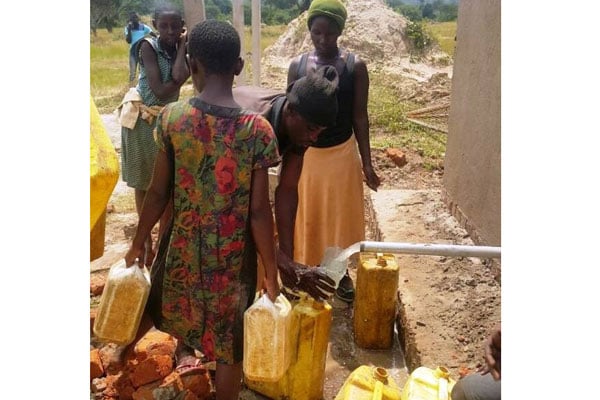Less money, water: Gomba’s double pain

Access to clean water. Residents fetch water from a tap. Authorities say low funding is affecting access to clean and safe water in the area. PHOTO | FILE
What you need to know:
- Under funding. According to a recent report by Water Aid, Essential Element, Uganda is one of the 45 developing countries facing chronic under-funding for water, sanitation and hygiene services.
- Access to sanitation. At least 31 per cent of households in Uganda lack access to clean and safe water and 19 per cent do not have access to sanitation.
Gomba. In Maddu Sub-county, Gomba District, residents have to walk for close to 10 kilometres to find safe and clean water for domestic use.
Mr Joseph Mubiru, a resident of Kajumiro Village, says he walks through three villages before he gets to a dam where he draws water.
His is an example of the difficulty the rest of the communities go through to access water in a sub-county where 69 per cent of households do not have access to clean and safe water.
“Imagine trekking 10 kilometres just to collect water which is also not safe for domestic use. We share that water source with animals,” he says during an interview on Saturday.
The problem, however, is also that the local authorities say government grants for safe water projects in Gomba have been dwindling over the years.
Mr Geoffrey Wamala, the assistant district water officer, says last financial year, the district received Shs360m to extend safe water points but it has been reduced to Shs300m this financial year, which he says is likely to derail their efforts to meet the 2020 safe water coverage target.
“We had planned to drill boreholes in six villages but we will instead serve three villages,” he says.
Water and Environment minister Sam Cheptoris recently said their target is to ensure that 79 per cent of rural communities have access to clean and safe water by 2020.
The minister’s promise comes against a recent survey by Water.Org, a non-governmental organisation, that 61 per cent of Ugandans lack access to safe water and that 75 per cent do not have access to improved sanitation facilities.
Plan B
Likewise, a 2017 Sauti wa Wanachi report by Twaweza, anon-governmental organisation, says only 24 per cent of Ugandans have access to piped water, either direct to their household, via a neighbour or from a communal standpipe or kiosk. The report also adds that 78 per cent households harvest rainwater as Plan B.
However, less than 1 per cent uses it as their main source of drinking water.
Also, 69 per cent of the households ran out after a week or less.
Mr Wamala says they have resorted to installing mini solar powered water pumps to pump water to storage tanks stationed on hills and later pump it to residents by gravity.
“With that technology, we hope we will extend water to more villages without necessarily drilling many boreholes,” he says. They, however, pay through the nose.
In Maddu Town Council where a solar-powered water pump has already been installed, residents pay Shs100 for a 20-litre jerrycan of water.
According to the district information officer, Mr Saleh Ssenyonjo, a mini solar–powered water pump costs about Shs65m and the district will need several of them to pump water to fill the storage tanks.
Mr Godfrey Kiviiri, the Gomba District chairperson, says: “As the population increases, safe water coverage will as well increase and save our people from the burden of sharing water sources with animals. Water stressed districts need to be considered in a special way and given reasonable funds to increase safe water.”
Not spared
The water scarcity does not end at household level. Ms Grace Kizito, the secretary for health and education, says health centres are ailing.
“It is lack of clean water that has seen Maddu Health Centre IV theatre non-functional for close to four years now yet it is the top ranked government facility in the district,” she reveals.
Education institutions have not been spared, too. Ms Kizito says during the dry spells, pupils spend longer hours collecting water for their parents and in the long run miss school.



